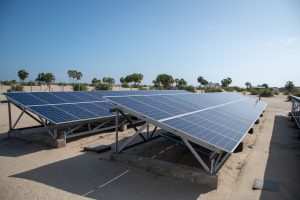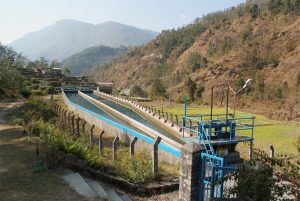Power System Transformation
"Revolutionising Indonesia's Energy Grid for a Sustainable Future"
Transforming over 600 Indonesian power systems from fossil fuel reliance to decentralised, renewable energy sources, ensuring a resilient and sustainable energy landscape.
Mission Statement
GIZ supports Indonesia towards the transformation of more than 600 power systems of various sizes from central, fossil fuel-based power generation to decentralised, renewable energy-based power generation.
Why?
As an archipelago, Indonesia has more than 600 power grids, which brings a unique challenge in developing the various island grids. Distribution and transmission grid planning and operation are traditionally designed for power generation from dispatchable power plants, which are typically fossil fuel- and hydro-based. Those planning and operation processes need to be adjusted to account for high shares of variable renewable energy – i.e. massive solar and some wind power. Especially, the role of distribution grid operators changes significantly when distributed energy resources – predominantly rooftop solar – are increasingly connected to medium and low voltage grids. Therefore, effective power system transformation is a key precondition when rapidly expanding renewable energy generation to get the energy transition underway.
What?
With whom?
GIZ collaborates, at national level, with the Ministry of Energy and Natural Resources (MEMR) as political partner and the subordinated Directorate General of Renewable Energy and Energy Conservation (DG EBTKE) as implementation partner, responsible for regulating the renewable energy expansion for the power system transformation. The subordinated Directorate General of Electricity (DJK) elaborates power system-related regulations.
The 600 power systems in Indonesia are planned, transformed, and operated by the State Electricity Company (PLN). Therefore, PLN is the key beneficiary of GIZ’s technical assistance activities regarding power system transformation at national and sub-national levels. To offer deep technical assistance activities to PLN, GIZ and PLN have signed a Memorandum of Understanding, which enables PLN to share real grid-data with GIZ.
- PLN Head Office: GIZ supports national and sub-national power system planning and procurement processes for renewable energy.
- PLN units in the various operating areas (Wilayahs): GIZ collaborates on evaluating the situation on the ground in regions, such as Sulawesi and Nusa Tenggara Timur, and conducts tailored power system analyses and long-term planning studies using advanced modelling techniques.
- PLN Education and Training Centres (Pusdiklats): GIZ conducts comprehensive capacity development for PLN, at both HQ and field level, and implements related power system training of trainers programmes.
How?
The Energy Programme uses various instruments and approaches to achieve the strategic theme of Power System Transformation:
- Policy advisory for MEMR, specifically EBTKE and DJK
- Capacity development for MEMR and PLN, at both HQ and field level
- Power system studies (operational analyses and long-term planning) on real power systems for PLN
- Integrated energy planning for selected cities/provinces/islands
When?
GIZ supports the targets outlined by the Government of Indonesia towards NZE 2060, and the JETP. This entails the following success indicators:
- Training of PLN professionals from the fields of grid expansion planning, technical design and grid operation to improve their expertise in planning, design or grid operation of/with variable renewable energy resources.
- Demonstration of economically feasible potential for variable renewable energy resources in regional power systems in cooperation with the respective responsible units of PLN at the national and regional levels.
Who?
- Thematic Lead: Christoph Luerssen
- Topic expert: Grace Triana Perangin Angin (power system)
- Energy Programme Director: Lisa Tinschert



